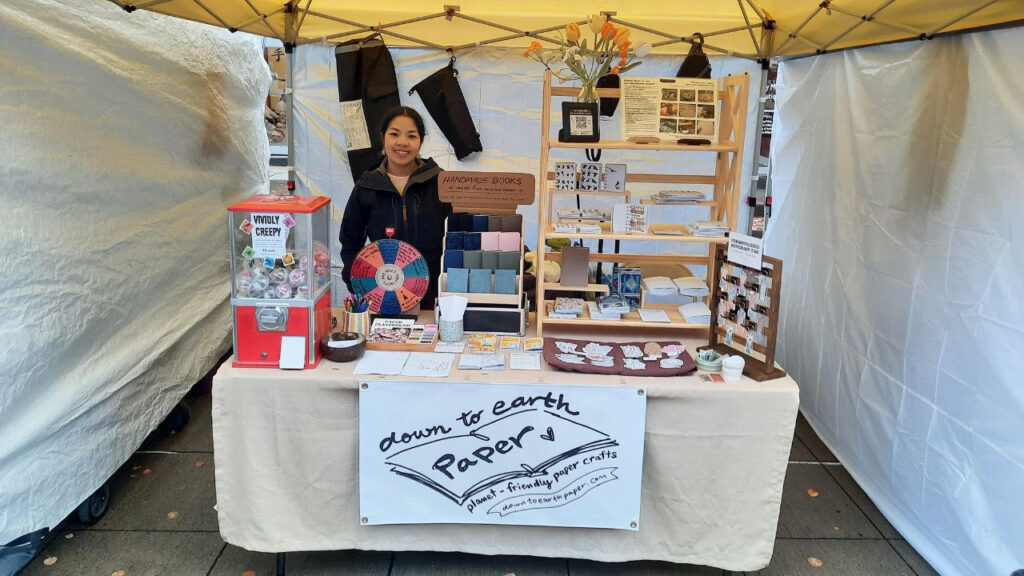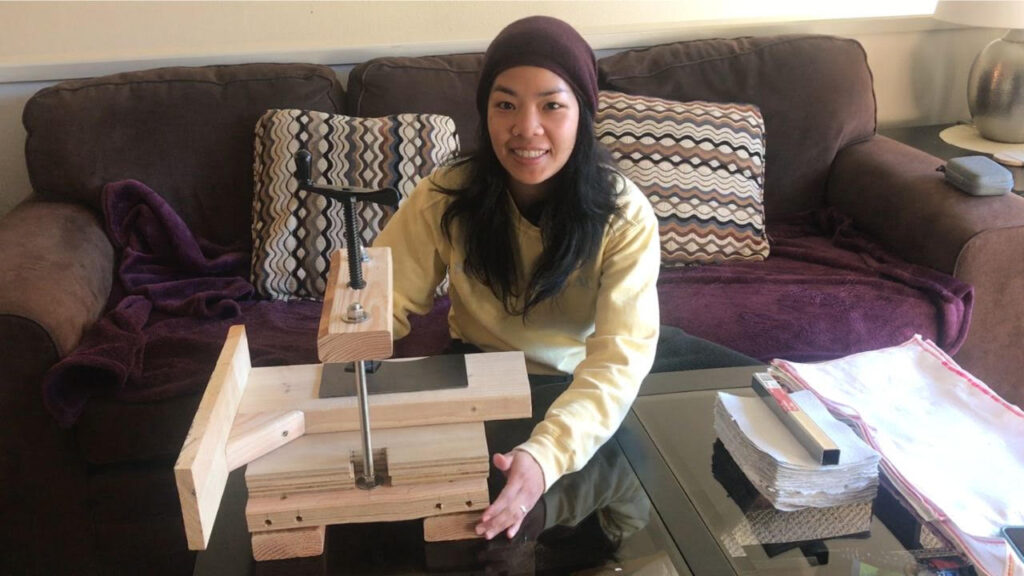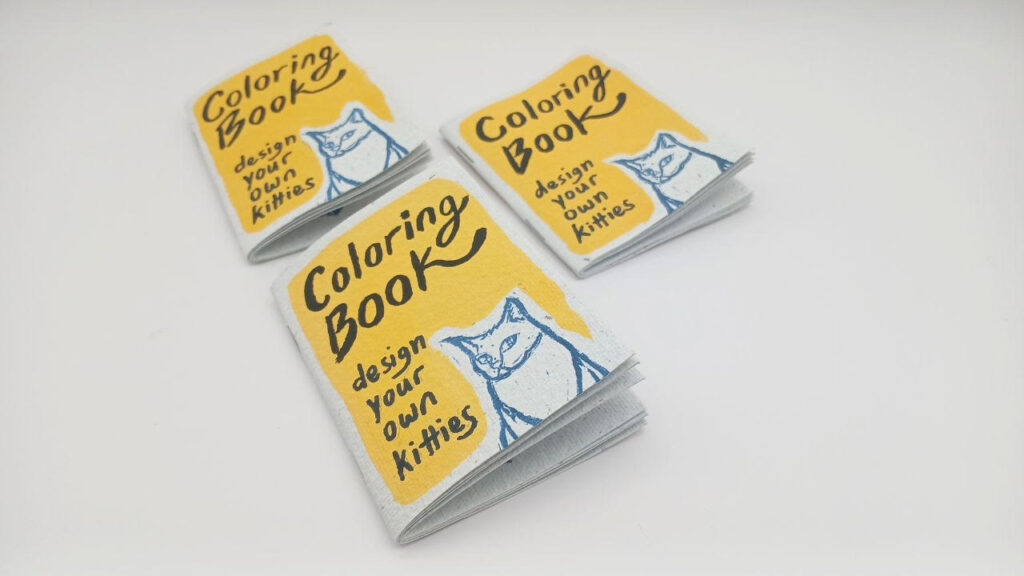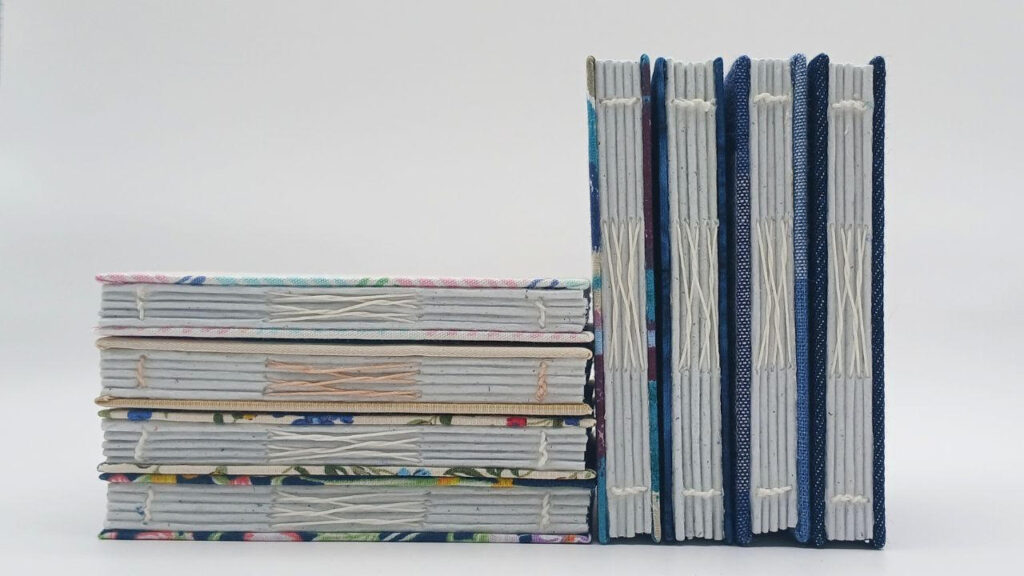By Kai Curry
NORTHWEST ASIAN WEEKLY

What setting up at a market or fair looks like. Homsaen includes a wheel that visitors can spend for a coupon or free gift. Photo courtesy of Gift Homsaen and Down to Earth Paper.
When Gift Homsaen left her job earlier this year as a web developer to chase her passion for paper, it wasn’t just a career move, it was a leap of faith. Now, she and her husband, Andrew Keating, are turning recycled paper into a full-time business. For America Recycles Day (Nov. 15), the Northwest Asian Weekly spoke to Gift about her journey so far.

Gift Homsaen with the paper press made by her husband, Andrew Keating. Photo courtesy of Gift Homsaen and Down to Earth Paper.
Originally from Korat, Thailand, Homsaen and her husband live in Sammamish. Her online shop, Down to Earth Paper, features recycled paper crafts like notebooks, watercolor pads, and stickers. Since the business is fairly new, Homsaen is still exploring the best approach and the best products to offer. Her husband supports her fully, including providing financial support for supplies, setting up at craft fairs and markets, and crafting what she needs in her workshop (a paper press, a book press, shelving, general organizational tasks).

Handmade coloring books by Gift Homsaen at Down to Earth Paper. Photo courtesy of Gift Homsaen and Down to Earth Paper.
Paper crafting is a lot of work and it’s a niche area that, like many arts and crafts, can be a hard sell due to the price tag on handmade work. To help potential customers understand where she’s coming from, Homsaen likes to tell stories about her work through newsletters and on her website. One of her biggest priorities, and one of the reasons she chose this pursuit, is her dedication to low-waste living. Even back when Homsaen was developing websites for clients, she paid attention to things like carbon footprint. In her family’s daily life, she is deliberate about shopping locally and buying fresh ingredients. She and her husband have weaned themselves off of purchasing everything the easy way, off the internet, and strive to live a more sustainable lifestyle, for themselves and for the planet. They also help out by welcoming scrap paper from the community, sometimes even allowing people into their home to shred personal documents.

Custom mini books by Gift Homsaen at Down to Earth Paper. Photo courtesy of Gift Homsaen and Down to Earth Paper.
Homsaen said we already have abundant resources, and we have the ability to turn them into something that can be reused. She takes the paper and mixes it into a pulp, presses it into sheets, and finally, makes the paper into a handy and attractive notebook or other paper-based item. Any kind of paper will do, even old bills and other documents with print on them. It all comes out in the process and turns into a pleasing, blue-tinged white, in most cases. Her notebooks come in several sizes, and are becoming popular as thank-you gifts and “swag” for companies and their events. Being that Homsaen makes everything herself, a large order is a welcome and also a time- and effort-consuming labor of love. It’s her pleasure and her dream.
As a freelance web developer in her recent prior life, Homsaen found herself spending too much time in front of the computer. It was hard to set boundaries in terms of scheduling, and she was burning out. “It’s nonstop and draining,” she said. Homsaen enjoyed the work, yet felt that she did not have a balanced life. She had loved crafts since she was a child in Thailand. There, where her parents own a farm that harvests many foods, including cashews, Homsaen used to watch her mother and her aunts crocheting, weaving, and making other fabric arts. Homsaen was always ambitious to come to the United States. She enjoys Western culture, and she wanted to explore other places and other ways of living. She moved to Seattle in 2018 to pursue a certificate in global business at the University of Washington. She lived with an aunt until completing an internship, and then decided to continue her education in programming and web development at Seattle Central College. This was around the time of the outbreak of the COVID-19 pandemic. Homsaen then met her husband and moved to Sammamish, where she lives now.
Homsaen is still on the computer quite a lot, making content for her business, yet she is much happier, and healthier, in this new phase of life.
“Paper crafting gives me a lot more time to ground myself with hands-on activities, where I can touch and make physical things,” Homsaen told the Asian Weekly. “It gives me more meaning and it feels more rewarding. It gives me a better balance for my life and gives me more joy.” Homsaen learned about the craft, at first, from a YouTube video. She thought it looked easy and tried out her first batch, with success. She decided then to invest herself into the idea of creating a business from this new hobby. Now, Homsaen is creating her own videos on how to make paper products. Sustainability is her passion, even more so since she moved to Seattle, where there has been more opportunity to live in an environmentally conscious way. This business fits right into it.
“It’s so easy to make paper crafts using paper you already have at home,” Homsaen said. In her view, it’s better to repurpose something rather than having it end up in a landfill. It’s a meaningful activity for her to upcycle materials into something beautiful and useful. Homsaen also employs secondhand fabric in her products, such as for the notebook covers. She finds the fabric at thrift stores. “That is also a big part of my crafting journey,” she said.
America Recycles Day was established in 1997. The Environmental Protection Agency recognizes the importance and impact of recycling every year on Nov. 15, and of course, all year. While recycling has increased significantly in the United States over the years, from 7% in 1960 to 32% at the most recent calculation, the National Recycling Goal is 50% by 2030. As of early 2024, Germany was the “champion” of recycling, at 67%, with Sweden and South Korea close behind. This is slightly different from the Environmental Performance Index Score, or EPI, where Europe excels, with Switzerland at the top. For EPI, the United States is not even in the top 20. One problem with recycling programs in the United States, and elsewhere, is that even if a person dutifully places their recycling in the correct bin, it might not end up recycled, but instead at a landfill anyway, due to decisions made by the companies and organizations that collect our trash, and the trash pipeline.
Homsaen’s parents are happy about their daughter’s new life. With the invaluable support of her husband, Homsaen, too, is happy she chose this path, even if there are adjustments to be made. For anyone considering pursuing their passion in something perhaps unconventional or challenging in terms of making an income, Homsaen says, “Go for it. Don’t think too much.” Clarity will come from taking action, she said. It’s helpful to have a backup source of income, like she does, with her website developing, something she can take up anytime. Ideally, though, Homsaen hopes that this paper crafting labor of love will flourish and remain full-time. That everyone will understand the value of her hand-made work, for themselves and for the planet.
November is National Recycling Month. For other resources, see:
https://sustainability.uw.edu/blog/america-recycles-day
https://kab.org/our-signature-programs/america-recycles-day/
Kai can be reached at newstips@nwasianweekly.com.


